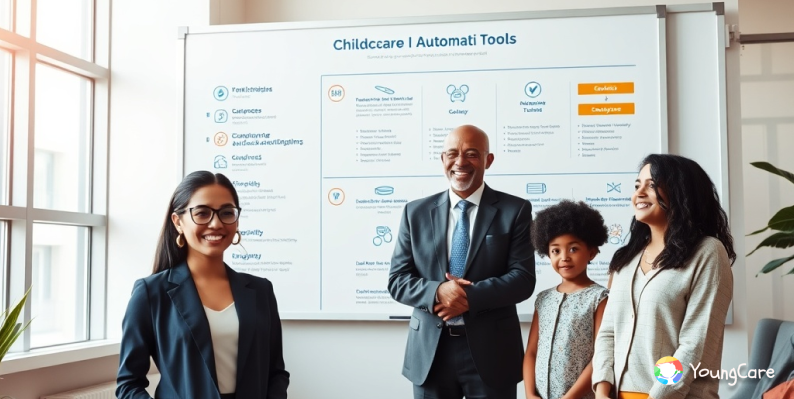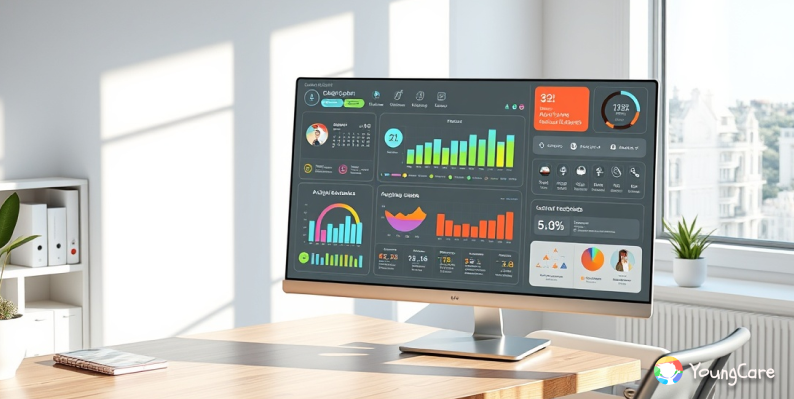Childcare automation tools have transformed early childhood education by simplifying complex administrative processes, improving parent engagement, and ensuring compliance. These systems—ranging from digital attendance tracking to billing automation—help centers operate efficiently and focus on what matters most: nurturing young minds. Despite challenges like training and cost, the rise of AI and cloud-based solutions promises an even more connected and adaptive childcare future.
Introduction

In today’s fast-paced world of early childhood education, childcare automation tools are proving to be a true game-changer. These advanced childcare management solutions streamline administrative tasks, enhance parent engagement, and significantly improve the quality of care in daycare and preschool centers. For childcare providers aiming to maintain nurturing environments while managing complex daily operations, automation tools for childcare have become an indispensable part of modern educational management.
Background and Origin

The concept of childcare automation originated to simplify and organize the numerous administrative tasks involved in managing a childcare center. Traditionally, childcare providers relied on manual processes for attendance tracking, billing, and parent communication, which were time-consuming and prone to errors. With advances in childcare management software, these processes are now automated, enabling staff to dedicate more time to providing high-quality care and fostering a nurturing environment for children.
Core Ideas and Features

Childcare automation tools offer a comprehensive set of features to optimize childcare center operations and improve efficiency:
- Automated Attendance Tracking: Real-time attendance monitoring ensures compliance with staff-to-child ratios and simplifies billing processes.
- Integrated Billing and Payments: Automation in invoicing reduces administrative burdens and minimizes errors.
- Parent Communication Tools: Messaging systems and daily reports strengthen parent-provider relationships and foster transparency.
- Virtual Child Profiles: Digital records enhance care coordination by storing essential information about each child.
- Digital Sign-In Systems: Secure, parent-led sign-in processes streamline drop-off and pick-up logistics while maintaining safety and efficiency.
Real-World Applications

Childcare automation tools are transforming operations and delivering measurable benefits in childcare centers worldwide:
- Efficiency and Cost Savings: Automation in childcare management reduces administrative costs and enables better resource allocation.
- Enhanced Parent Engagement: Real-time updates and communication tools strengthen parental trust and satisfaction, fostering a stronger parent-provider relationship.
- Improved Compliance: Automated attendance tracking ensures adherence to regulatory requirements, minimizing the risk of non-compliance and promoting safe, structured care.
Challenges and Limitations

Despite the numerous advantages of childcare automation tools, several challenges in childcare technology adoption remain:
- Adoption and Training: Implementing new childcare software often requires significant staff training and may face resistance from employees.
- Data Security: Protecting sensitive child and family data is critical, necessitating strong security measures and compliance with privacy regulations.
- Cost and Accessibility: Smaller childcare centers may encounter difficulties due to the implementation costs of automation tools, impacting operational efficiency.
Emerging Trends and Future Possibilities

As childcare technology continues to advance, childcare automation tools are poised for significant evolution:
- AI Integration: Leveraging artificial intelligence in childcare can enhance predictive analytics, create personalized care plans, and optimize child development outcomes.
- Cloud-Based Solutions: Cloud technology for childcare centers enables remote management of operations, improving flexibility and staff efficiency.
- Integration with Educational Tools: Future childcare management systems may boost learning outcomes by integrating seamlessly with digital educational platforms.
Conclusion
Legal AI for compliance monitoring is no longer optional—it’s a strategic imperative. Organizations adopting AI responsibly can transform compliance from a reactive obligation into a proactive advantage, improving regulatory adherence, operational efficiency, and overall corporate governance.
Ready to transform your compliance processes with AI? Explore our AI-powered recruitment and compliance solutions today. Visit our contact page to learn how Legal AI can streamline your operations and enhance your organizational oversight.

